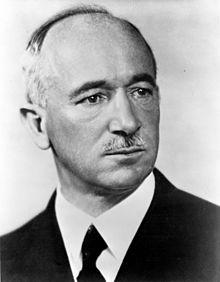Eduard Beneš
| Edvard Beneš | |
|---|---|

Beneš, c. 1942
|
|
| 2nd & 4th President of Czechoslovakia | |
|
In office 2 April 1945 – 7 June 1948 |
|
| Preceded by | Emil Hácha |
| Succeeded by | Klement Gottwald |
|
In office 18 December 1935 – 5 October 1938 |
|
| Preceded by | Tomáš Garrigue Masaryk |
| Succeeded by | Emil Hácha |
| President of Czechoslovakia in exile | |
|
In office October 1939 – 2 April 1945 |
|
| Prime Minister | Jan Šrámek |
| 4th Prime Minister of Czechoslovakia | |
|
In office 26 September 1921 – 7 October 1922 |
|
| Preceded by | Jan Černý |
| Succeeded by | Antonín Švehla |
| Minister of Foreign Affairs of Czechoslovakia | |
|
In office 14 November 1918 – 18 December 1935 |
|
| Preceded by | Position established |
| Succeeded by | Milan Hodža |
| Personal details | |
| Born |
28 May 1884 Kožlany, Bohemia, Austria-Hungary (now Czech Republic) |
| Died | 3 September 1948 (aged 64) Sezimovo Ústí, Czechoslovakia (now Czech Republic) |
| Political party |
Realist Party National Socialist Party |
| Spouse(s) | Hana Benešová (1885-1974) |
| Alma mater |
Charles University in Prague University of Paris Paris Institute of Political Studies |
| Signature |  |
Edvard Beneš, sometimes anglicised to Edward Benes (Czech pronunciation: [ˈɛdvard ˈbɛnɛʃ]; 17 May 1884 – 3 September 1948), was a Czech politician who was twice President of Czechoslovakia (1935–1938 and 1945–1948). He was also Minister of Foreign Affairs (1918–1935), 4th Prime Minister of Czechoslovakia (1921–1922) and the President of Czechoslovakia in exile (1939–1945). A member of the Czechoslovak National Social Party, he was known as a skilled diplomat.
He was born into a peasant family in 1884 in the small town of Kožlany, Bohemia, in the Austro-Hungarian Empire. He was the son of Anna Petronila Benešová and Matěj Beneš. His brother was the Czechoslovak politician Vojta Beneš. His nephew Bohuš Beneš, a diplomat and son of his brother Václav, was the father of Emilie Benes Brzezinski and Václav E. Beneš, a Czech-American mathematician.
Beneš spent much of his youth in the Vinohrady district of Prague, where he attended a grammar school from 1896 to 1904. He then played association football for Slavia Prague. After studies at the Faculty of Philosophy of the Charles University in Prague, he left for Paris and continued his studies at the Sorbonne and at the École libre des sciences politiques (Independent School of Political and Social Studies). He completed his first degree in Dijon, where he received his doctorate of law in 1908. He then taught for three years at the Prague Academy of Commerce, and after his 1912 habilitation in philosophy, he became a lecturer in sociology at Charles University. He was also involved in scouting.
...
Wikipedia
